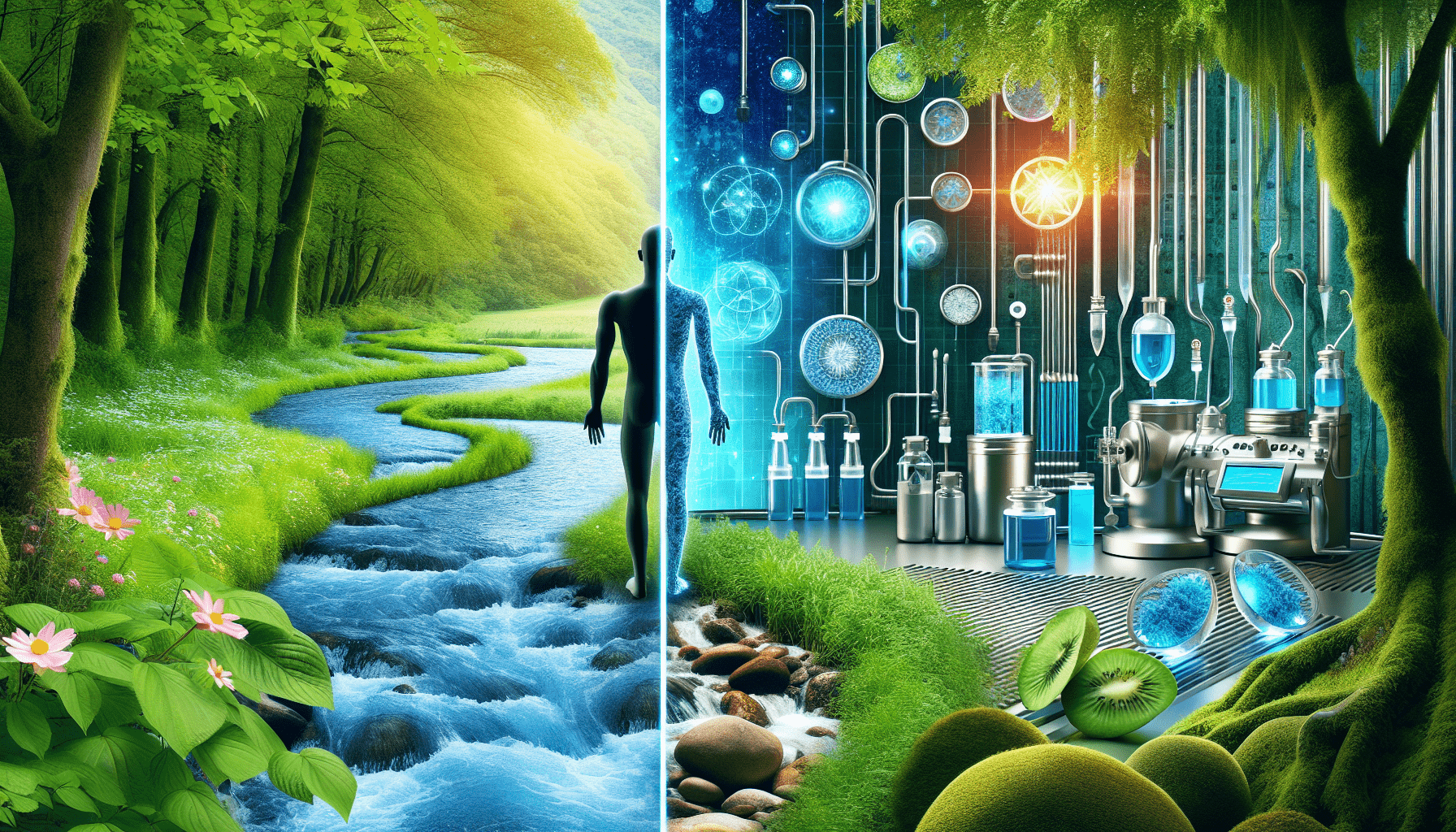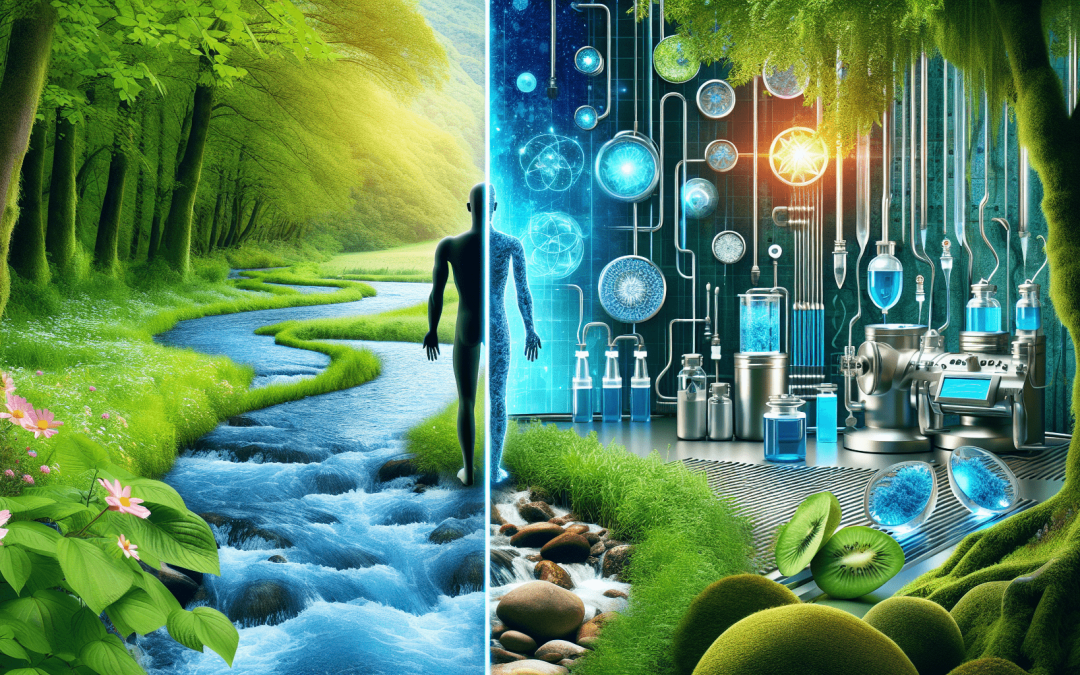Have you ever wondered about the best way to cleanse your body and eliminate toxins? In the ongoing debate between natural detox and artificial cleansing methods, it’s important to understand the potential benefits and drawbacks of each approach. Natural detox involves utilizing the power of nature, incorporating fresh fruits, vegetables, and herbal remedies to enhance your body’s own detoxification processes. On the other hand, artificial cleansing methods, such as juice cleanses or detox teas, offer a convenient and quick fix, but may not provide the same long-term benefits. In this article, we’ll explore the differences between natural detox and artificial cleansing, helping you make an informed decision on which one is right for you.
Definition of Natural Detox
Exploring the concept of natural detoxification
Natural detox refers to a process in which the body eliminates toxins and harmful substances naturally. It is a method that relies on the body’s own mechanisms to cleanse and purify itself, promoting overall health and well-being. Natural detoxification involves various organs and systems in the body working together to eliminate waste products, including the liver, kidneys, lymphatic system, lungs, and skin.
Understanding how the body naturally detoxifies itself
The body has several ways to detoxify itself naturally. The liver, for example, plays a crucial role in filtering and metabolizing toxins, turning them into less harmful substances that can be eliminated through bile or urine. The kidneys also work to filter waste products from the blood and excrete them as urine. The lymphatic system helps remove toxins and waste materials from the body’s tissues, while the skin eliminates toxins through sweat. Lastly, the lungs assist in detoxification by removing toxins through respiration.
Benefits of Natural Detox
Improved digestion and gut health
Natural detox can improve digestion and promote a healthier gut. By eliminating toxins, the body allows the digestive system to function more efficiently, reducing issues such as bloating, constipation, and indigestion. A clean and healthy gut also supports the growth of beneficial bacteria, which aid in nutrient absorption and overall digestive health.
Boosted immune system function
Engaging in natural detoxification practices can enhance the function of the immune system. By reducing the toxic load on the body, the immune system can focus on fighting pathogens and preventing illness. A strong immune system is crucial for protecting against infections, allergies, and autoimmune disorders.
Increased energy levels
Natural detox can lead to increased energy levels. When the body is burdened with toxins, it can feel sluggish and fatigued. By eliminating these toxins, the body’s energy production systems can function optimally, resulting in improved energy levels and overall vitality.
Weight loss and management
Natural detox approaches can support weight loss and management efforts. Toxins can be stored in adipose tissue, and when the body eliminates these toxins, it promotes the breakdown of fat cells. Additionally, by adopting a healthy diet and lifestyle during a natural detox, individuals may experience improved metabolism, reduced cravings, and better control over their weight.
Clearer skin and improved appearance
Natural detox can have a positive impact on the skin, resulting in a clearer complexion and an improved appearance. By removing toxins from the body, the skin can become healthier, reducing issues such as acne, blemishes, and inflammation. Natural detoxification can also improve the skin’s elasticity and overall radiance.
Reduced inflammation and chronic pain
Engaging in natural detox practices may help reduce inflammation and chronic pain. Many toxins contribute to inflammation in the body, leading to discomfort and pain. Through natural detoxification, these toxins are eliminated, potentially providing relief from inflammatory conditions such as arthritis, fibromyalgia, and allergies.

Methods of Natural Detox
Eating a healthy, varied diet
A healthy, varied diet is a fundamental aspect of natural detoxification. Consuming nutrient-rich foods, such as fruits, vegetables, whole grains, and lean proteins, provides the body with essential vitamins, minerals, and antioxidants. These nutrients support the body’s natural detoxification processes and aid in the elimination of toxins.
Drinking plenty of water
Staying hydrated is crucial for natural detoxification. Water helps flush out toxins through urine and sweat, promoting the proper functioning of the kidneys and the lymphatic system. Adequate water intake also aids digestion and supports overall cellular health.
Exercising regularly
Regular exercise plays a significant role in natural detoxification. It helps increase blood circulation and lymphatic flow, facilitating the elimination of toxins from the body. Physical activity also promotes sweat production and deep breathing, assisting the body in eliminating toxins through the skin and lungs.
Getting enough sleep
Sufficient sleep is essential for natural detoxification. During sleep, the body goes through a process of repair and regeneration, including the elimination of toxins. Lack of sleep can disrupt these processes and hinder the body’s ability to cleanse itself effectively. Aim for 7-9 hours of quality sleep each night to support natural detoxification.
Reducing stress levels
Managing stress is crucial for natural detoxification. High levels of stress can activate the body’s stress response, which can impede the detoxification process. Engaging in stress-reducing activities such as meditation, yoga, deep breathing exercises, and spending time in nature can help promote relaxation and support the body’s natural detoxification mechanisms.
Avoiding or limiting exposure to toxins
Preventing exposure to toxins is an important aspect of natural detoxification. Limiting the consumption of processed foods, alcohol, tobacco, and exposure to environmental pollutants can help reduce the toxic load on the body. Opting for organic produce, using natural cleaning and personal care products, and improving indoor air quality can all contribute to a healthier, toxin-free environment.
Risks and Limitations of Natural Detox
Possible lack of scientific evidence
The field of natural detoxification is still an area of ongoing research, and some detox methods may lack substantial scientific evidence to support their effectiveness. While many individuals report positive outcomes from natural detox practices, more research is needed to establish the specific benefits and mechanisms behind these approaches.
Not suitable for everyone
Natural detox methods may not be suitable for everyone, especially those with underlying health conditions or who are on certain medications. Pregnant or breastfeeding individuals and those with compromised immune systems should exercise caution and consult with a healthcare professional before engaging in any detoxification practices.
May cause temporary discomfort
During a natural detox, some individuals may experience temporary discomfort, commonly referred to as a detox reaction or healing crisis. Symptoms can include headaches, fatigue, muscle aches, and digestive disturbances. These symptoms are often temporary and are considered a normal part of the detoxification process as toxins are being eliminated from the body.
May not be effective for severe toxin exposure
While natural detox methods can be beneficial for overall health and well-being, they may not be effective for individuals with severe toxin exposure, such as those who work with hazardous chemicals or have undergone certain medical treatments. In these cases, seeking professional medical help is essential for appropriate detoxification support.

Definition of Artificial Cleansing
Introduction to artificial cleansing methods
Artificial cleansing refers to the use of specific techniques, products, or procedures to facilitate the elimination of toxins from the body. Unlike natural detoxification, which relies on the body’s own mechanisms, artificial cleansing approaches aim to accelerate the detox process or provide targeted detoxification for certain toxins or organs.
Common examples of artificial cleansing techniques
Artificial cleansing encompasses various methods, including colon cleansing or colonics, detox diets and juice cleanses, the use of supplements and detox products, and saunas and sweat therapy. These methods are often used as a short-term approach to cleanse the body quickly or target specific toxins or organs.
Benefits of Artificial Cleansing
Fast and noticeable results
One of the significant benefits of artificial cleansing is the ability to achieve fast and noticeable results. By using specific techniques or products, individuals may experience a more immediate elimination of toxins, leading to a perceived sense of rejuvenation and well-being.
Specific targeting of certain toxins
Artificial cleansing methods can offer specific targeting of certain toxins or organs in the body. For example, colon cleansing focuses on removing toxins and waste from the colon, while saunas and sweat therapy aim to eliminate toxins through the skin. These targeted approaches can be beneficial for individuals looking to address particular health concerns or detoxify specific body systems.
May provide temporary relief from certain symptoms
Artificial cleansing techniques have the potential to provide temporary relief from certain symptoms. For example, individuals experiencing bloating or digestive discomfort may find relief through colon cleansing. However, it is important to note that these benefits may be short-lived and may not address the underlying causes of the symptoms.

Methods of Artificial Cleansing
Colon cleansing or colonics
Colon cleansing, also known as colonics, involves the irrigation of the colon to remove accumulated waste and toxins. This technique uses water or herbal solutions to flush out the colon, potentially promoting detoxification and improving digestive function.
Detox diets and juice cleanses
Detox diets and juice cleanses involve consuming specific fruits, vegetables, or liquids for a designated period to eliminate toxins from the body. These diets often restrict certain food groups and emphasize the intake of nutrient-dense fluids to support detoxification.
Supplements and detox products
Supplements and detox products are commonly used in artificial cleansing. These may include herbal remedies, dietary supplements, or specialized detoxification formulas designed to support the body’s detoxification processes and enhance toxin elimination.
Saunas and sweat therapy
Saunas and sweat therapy are artificial cleansing methods that utilize heat and sweating to promote the elimination of toxins through the skin. By spending time in a sauna or engaging in sweat-inducing activities, individuals may facilitate the release of toxins from the body.
Risks and Limitations of Artificial Cleansing
Potential side effects and complications
Artificial cleansing methods may carry potential side effects and complications. Colon cleansing, for example, can cause electrolyte imbalances, dehydration, or damage to the colon if not administered correctly. It is essential to consult with a healthcare professional before engaging in any artificial cleansing practices.
Lack of long-term effectiveness
While artificial cleansing techniques may offer immediate benefits, they may not have long-lasting effects on overall health and detoxification. Without adopting sustainable lifestyle changes and addressing the underlying causes of toxin accumulation, the effects of artificial cleansing may be temporary.
May promote unhealthy habits or mindset
Artificial cleansing methods can sometimes promote an unhealthy mindset or habits regarding detoxification. Rigid diet restrictions, excessive reliance on supplements, or frequent sauna sessions may lead to an unhealthy obsession with cleansing or detoxing, potentially causing adverse physical or psychological effects.

Comparison of Natural Detox and Artificial Cleansing
Effectiveness and reliability
Natural detoxification relies on the body’s inherent mechanisms and provides a gradual and sustainable approach to eliminating toxins. While it may take longer to see noticeable effects, natural detox is generally considered a safer and more reliable method compared to artificial cleansing, which can provide fast but potentially short-lived results.
Sustainability and long-term benefits
Natural detox approaches focus on lifestyle changes, promoting a sustainable approach to overall health and wellness. By adopting healthy dietary habits, regular exercise, and stress reduction techniques, individuals can continuously support their body’s natural detoxification processes and reap long-term benefits. Artificial cleansing methods, on the other hand, may provide short-term benefits but may not be sustainable or offer lasting results.
Consideration of individual health and lifestyle
When choosing between natural detox and artificial cleansing, it is crucial to consider individual health and lifestyle factors. Natural detox methods can be beneficial for most individuals, although certain health conditions or medications may require caution or professional guidance. Artificial cleansing techniques may offer targeted benefits but may not be suitable for everyone, especially those with underlying health conditions or who are on certain medications.
Scientific evidence and support
Natural detoxification is an area of ongoing research, and while anecdotal evidence supports its benefits, more scientific studies are needed to establish its efficacy fully. Artificial cleansing methods often lack substantial scientific evidence to support their claims, and it is essential to critically evaluate the available research before engaging in such practices.
Cost and accessibility
In terms of cost and accessibility, natural detox methods tend to be more affordable and accessible to a wider population. Healthy dietary choices, regular exercise, and stress management techniques can be implemented without significant financial burden. Artificial cleansing methods often require specific products, supplements, or specialized treatments, which may be costly and less accessible to everyone.
Choosing the Right Approach
Consulting with healthcare professionals or experts
When considering natural detox or artificial cleansing, it is vital to consult with healthcare professionals, nutritionists, or experts in the field. They can provide personalized advice and guidance based on individual health status, goals, and preferences. Professional input ensures a safe and appropriate approach to detoxification.
Considering personal goals and preferences
Personal goals, preferences, and individual circumstances play a significant role in choosing the right detox approach. Some individuals may prefer a gradual and sustainable lifestyle change, while others may opt for a more immediate but potentially short-lived detoxification method. Understanding personal goals and preferences helps in selecting the most suitable approach.
Balancing natural detox and artificial cleansing methods
Lastly, individuals can consider incorporating a combination of natural detox and artificial cleansing methods. By adopting healthy lifestyle habits and supporting the body’s natural detoxification processes, individuals can lay a foundation for optimal health. They can also incorporate occasional artificial cleansing techniques to provide targeted detoxification or address specific health concerns.
In conclusion, natural detox and artificial cleansing are two approaches that aim to eliminate toxins from the body. Natural detox relies on the body’s own mechanisms and promotes overall health through lifestyle changes, while artificial cleansing methods provide fast but potentially short-lived results through specific techniques or products. Choosing the right approach involves considering individual health, goals, scientific evidence, and personal preferences. Consulting with healthcare professionals and finding a balance between natural detox and artificial cleansing methods can support optimal detoxification and overall well-being.

Related Content
- Detox Your Body Naturally: Easy and Effective Methods
- The Ultimate 2025 Guide to Natural Detoxification Support: 7 Effective Tips
- 10 Effective Natural Detox Plan Strategies for 2025 to Boost Your Health
- Detox for Weight Loss: Effective Strategies
- The Ultimate Guide to Safe Detox Without Fasting in 2025: 7 Effective Strategies




